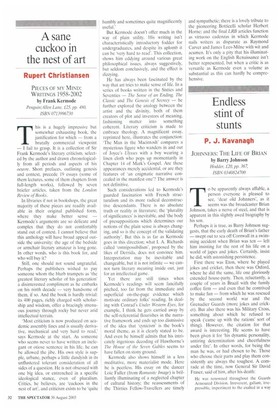A sane cuckoo in the nest of art
Rupert Christiansen
PIECES OF MY MIND: WRITINGS 1958-2002 by Frank Kermode Penguin/Allen Lane, .£25, pp. 480, ISBN 0713996730 This is a hugely impressive but somewhat exhausting book, the
justification for which from a brutally commercial viewpoint — I fail to grasp. It is a collection of Sir Frank Kermode's literary criticism, selected by the author and drawn chronologically from all periods and aspects of his oeuvre. Short prefaces, outlining genesis and context, precede 19 essays (some of them lectures, some of them chapters from full-length works), followed by seven briefer articles, taken from the London Review of Books.
In libraries if not in bookshops, the great majority of these pieces are readily available in their original published form, where they make better sense — Kermode's arguments are so delicate and complex that they do not comfortably stand out of context. I cannot believe that this anthology will have broad appeal outside the university: the age of the bedside or armchair literary amateur is long gone. In other words, who is this book for, and who will buy it?
Still, one should not sound ungrateful. Perhaps the publishers wished to pay someone whom the blurb trumpets as 'the greatest literary scholar of his generation' a disinterested compliment as he embarks on his ninth decade — very handsome of them, if so. And the book is hardly trivial: its 400 pages, richly charged with scholarship and wisdom, offer a bracingly strenuous journey through rocky but never arid intellectual terrain.
'Most criticism is now produced on academic assembly lines and is usually derivative, mechanical and very hard to read,' says Kermode at the start. As someone who seems never to have written an inelegant or otiose sentence in his life, he can be allowed the jibe. His own style is supple, urbane, perhaps a little dandyish in its unflustered tolerant consideration of all sides of a question. He is not obsessed with one big idea, or entrenched in a specific ideological stance, even of pluralism. Critics, he believes, are 'cuckoos in the nest of art', and criticism exists to be 'quite humbly and sometimes quite magnificently useful.'
But Kermode doesn't offer much in the way of plain utility. His writing isn't characteristically introductory fodder for undergraduates, and despite its aplomb it can be 'very hard to read'. This collection, shows him eddying around various great philosophical issues, always suggestively, but seldom conclusively, and the effect is dizzying.
He has always been fascinated by the way that art tries to make sense of life. In a series of books written in the Sixties and Seventies — The Sense of an Ending, The Classic and The Genesis of Secrecy — he further explored the analogy between the artist and the divinity, both of them creators of plot and investors of meaning, fashioning matter into something coherent. Literary criticism is made to embrace theology. A magnificent essay, reprinted here, illustrates the conjunction: The Man in the Macintosh' compares a mysterious figure who wanders in and out of Joyce's Ulysses with a boy wearing a linen cloth who pops up momentarily in Chapter 14 of Mark's Gospel. Are these appearances merely accidental, or are they features of 'an enigmatic narrative concealed in the manifest one'? The answer is not definitive.
Such considerations led to Kermode's guarded fascination with French structuralism and its more radical deconstructive descendants. There is no absolute truth or reality in literature; the 'plurality of significances' is inevitable, and 'the body of presuppositions which determines our notions of the plain sense is always changing, and so is the concept of the validating authority'. But this is as far as Kermode goes in this direction; what I. A. Richards called `omnipossibilism', proposed by the likes of Derrida, does not convince him. Interpretation may be inevitable and changeable, but it is not infinite — we cannot turn literary meaning inside out, just for an intellectual game.
Yet there are still times when Kermode's readings will seem fancifully pitched, too far from the immediate and superficial on-the-page evidence which motivate ordinary folks' reading. In dealing with Conrad's Under Western Eyes, for example, I think he gets carried away by the self-referential flourishes in the narrative framework and ends up too dismissive of the idea that 'cynicism' is the book's moral theme, as it is clearly stated to be. And even he himself admits that his intricately ingenious decoding of Hawthorne's The House of the Seven Gables seems to have fallen on stony ground.
Kermode also shows himself in a less meditative, more materialist mode. Here he is peerless. His essay on the dancer Loie Fuller (from Romantic Image) is brilliantly illuminating of a neglected chapter of cultural history; the reassessments of the Thirties Fellow-Travellers are timely and sympathetic; there is a lovely tribute to the pioneering Botticelli scholar Herbert Horne; and the final LRB articles function as virtuoso cadenzas in which Kermode nails writers as disparate as Raymond Carver and James Lees-Milne with wit and acumen. It's only a pity that his illuminating work on the English Renaissance isn't better represented, but when a critic is as versatile as Kermode even a volume as substantial as this can hardly be comprehensive.


























































 Previous page
Previous page